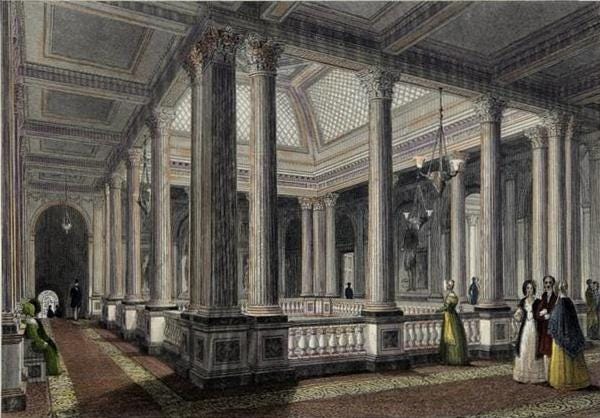Behind closed doors: The fascinating world of Britain's private clubs
I like to think of myself as pretty assimilated to British society, but there are some things I just don’t get no matter how hard I try: Doctor Who, Wagon Wheels and Strictly among them. Another one is British class consciousness.
Use the term ‘working class’ (Arbeiterklasse) in German and you sound like a communist apparatchik from a bygone age. The fact that Germans don’t think in those terms doesn’t mean Germany is world class when it comes to social mobility. On the contrary: its rigid, tiered education system is well known to perpetuate inequality of chances and has been condemned for that by the OECD. But what it does mean is that class, unlike ethnicity, gender, religion and sexuality, class isn’t really on people’s radar as a distinguishing factor.
Meanwhile Brits are perfectly happy to talk about so-and-so’s ‘working class background’ or how very ‘middle class’ something is. What people do and where they go depends on their class. Asda or Waitrose. Butlins or Centre Parks. Initially blissfully ignorant of the fact that someone with a ‘middle-class’ profession like me should be scornful of the pub chain Wetherspoon’s, I grew rather fond of their reasonably priced food and quirky venues before that was met with shock and horror. I’ve sat in former churches, barns and opera houses having a beer and a burger for under a tenner. What’s not to like? Ah, but one doesn’t go there. It’s not for people like me, apparently.
At the other end of the spectrum are London’s old gentlemen’s clubs. I had no real conception of them before I moved to Britain as there is no equivalent to them in Germany. Yes, there are a few like the Anglo-German Club in Hamburg but they are very much inspired by the British original.
The inherent and proudly upheld social exclusivity of private clubs even today is truly baffling for someone coming from a country that likes to pretend it has no social classes. And it’s not just the old and established clubs either. Some of the younger, more modern ones, equally insist that members fit within a certain social or professional field so that they can be among like minded people.
I get the appeal but I always feel like an observer rather than a guest in them. When a fellow writer, or a journalist or a filmmaker invites me to their club to discuss things, I’m always happy to oblige. I find these places fascinating in their conscious effort to create an environment that will appeal to a very specific demographic. A bohemian club in Soho will go out of their way to provide slightly mismatched furniture and fashionably run-down rooms for its clientele of creatives. Its older cousins on the other side of central London won’t let men in without a tie and members sit on leather armchairs playing Bridge.
This week I was invited for afternoon tea at the Reform Club, which belongs very much in the latter category. Founded in 1836 as an all-male club, it was a hub for progressives, mostly Radicals and Whigs. Membership is no longer tied to gender or politics though there are still more men.
Today, Queen Camilla and David Attenborough are among the many notable members, following in the footsteps of Winston Churchill, William Ewart Gladstone and Viscount Palmerston. Guy Burgess, the British spy, apparently amused himself here by spilling drinks down from the banisters of the upper gallery upon his unsuspecting victims below.
More fascinating than its political association even, at least for me as a writer, is the Reform Club’s literary history with authors like Siegfried Sassoon, Arthur Conan Doyle, William Makepeace Thackeray and H.G. Wells among those who took inspiration from the impressive architecture and fine collection of books.
In addition, the Reform Club features in one of my favourite childhood novels: Jules Verne's Around the World in Eighty Days. Its protagonist Phileas Fogg is a member and bets against his fellows that he can circumnavigate the world with the club as the start and end point of his journey. He walked to his home away from home every day:
“Phileas Fogg left his house in Saville Rown at half past eleven and, when he had put down his right foot five hundred and seventy times before his left foot, and his left foot five hundred and seventy times before his right foot, he arrived at the Reform Club, a huge edifice, standing in Pall Mall, that cost quite a hundred and twenty pounds to build.”
(Jules Verne, Around the World in Eighty Days, 1872)
When I approached the huge building on Pall Mall on Thursday, the door was immediately opened from the inside and a grey-haired man with spectacles inquired whom I was here to see. I told him and was rewarded with an ‘Ah yes, he will be waiting for you.’ A second man looked me critically up and down before his gaze settled on my trousers. ‘That’s not a pair of jeans you’re wearing is it, my dear? My eyesight isn’t so good anymore.’ I stepped back into the light to show that I was wearing a dark blue suit. I had come prepared.
Keep reading with a 7-day free trial
Subscribe to ZEITGEIST to keep reading this post and get 7 days of free access to the full post archives.


